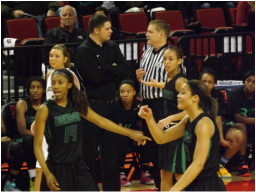
On the floor, the official should recognize that it is his chief function to keep the game running smoothly and to interpret and administer the official rules of the national body under whose auspices the game is being played. He should be immaculate in dress, always in command of himself and the game, and governed only by his best judgment based upon what he actually sees. During the game, his responsibilities are not those of player, coach, manager, scorer, time keeper, spectator or sportswriter; but he must always be aware of and sensitive to the maintenance of proper relationships with all of these groups of persons.
At the onset of the game, it is important to remember that the style of play, which he is to permit, will be determined by his officiating with the first few minutes of the game. As the game becomes fast, it is the officials business to keep it from becoming furious. As the atmosphere becomes more tense, the officials should keep a cool head. The score as such is none of the officials concern, regardless of what it may mean to a player, team, institution or community. In the long run, the official’s services will be in demand, depending upon the impartiality, promptness and clarity of his decisions. To players and spectators alike, the official must give the impression that he is in just as fine condition for his performance in the discharge of his duties as the players themselves.
Some officials are so “officious” that their very mannerisms antagonize both players and spectators. There is such a thing as poetry of motion. Some officials are like animated cartoons, and when they are in action no one wants to miss the “funnies” by taking their eyes off his antics, even to watch a fast basketball game. There is a difference between being on your toes and keeping ahead of the play, and running yourself dizzy to no good purpose. As gestures and signals should have meaning and be executed with grace and poise so as to convey to players, officials and spectators alike just what you want them to know. Remember, if you yourself are excited, not to betray it through over exaggerated movements. Your voice and its best use are also important. Speak clearly, but do not bawl or shout. You will soon discover how to use your voice to secure the best effect. The same applies to the use of the whistle. Too much whistle blowing ruins many a game otherwise good.
Know the rules, but do not give anyone the impression that you “know too much”. Never be sarcastic or want the last word. If a player is walking away after having his say-let him go. Never follow him or charge at a player, and above all, no pointing your finger and yelling at him. Hear only the things you should hear and see in your work! Remember that basketball is a highly competitive game and to destroy that thought would mean loss of interest. Allow that spontaneous “beef”, but don’t let it persist.
• Don’t worry. If you have a tough evening, review your work. One rough day doesn’t mean that you are a poor official. Review your work after every game and you will find that LOAFING is a principal cause of trouble.
• Never be cocky or have an antagonistic feeling toward the coach, player or the other official.
• Don’t be tense – as being too tight is often the cause of hasty and faulty decision. Act natural, as you are not the attraction.
• Have patience with coaches and players and keep your poise no matter how angry they appear to be. If you lose your temper also, then there is real trouble.
• No matter what your opinion may be of another official, either as a person or pertaining to his work, never make any adverse comment of any sort regarding him to anyone, either on or off the court. This is probably the most despicable breach of ethics among officials. Remember that none of us appear to others as we do to ourselves.
• You must have a good healthy body to house an alert, active mind. You owe this to yourself and to the game, so stay physically fit and HUSTLE.
• Be businesslike; show by your actions that you know what it is all about. Radiate confidence and efficiency, but don’t steal the show. Stay out of the limelight, always.
• Use uniform decisive actions in calling fouls, violations and infractions. This helps establish the faith of all concerned in your accuracy of judgment and eliminates any doubts as to your ability to do the job or the validity of your call.
• Train your voice and your whistle.
• ALWAYS HUSTLE. Be the first down the floor to the free throw line with a cheery “come on boys”. Keep both clubs on the move. Loafing is very contagious.
• To be a good official you must also be a good citizen. There are no successful dual characters in basketball.
• Dress the part, neat and clean, shoes shined.
• Give the game 100% of your attention; for just as you lapse or become interested in a particularly fine play or player that is when the roof will fall in. It never fails.
• Prepare. Learn something every day. Officiating will never be an open study. There will never be two games alike.
• There should always exist the friendliest feeling between officials working together. A feeling of confidence and trust is necessary to that you know that when you ask a question of any kind you are going to get a straightforward and truthful answer. To ask others to have faith in you, you must have faith in each other.
• If you partner asks your opinion of a play, don’t agree just to please him. It may mean trouble in the future. Tell him the way you saw it.
• Never discuss decisions with anyone but your partner and then, only in private.
• Try hard to be in a position to help if he requests it; don’t use the old alibi “I didn’t see it.”
• Never be jealous of any good break that your partner or any other official may get, your turn may be next. Don’t sulk and resent another person’s good fortune. Jealousy has ruined many good officials.
• Whenever possible, officials should travel to the game together, set together and leave the same way. Go directly to the dressing room and don’t stand around with outsiders. Stay away from athletic offices and school officials. If they want you, they know where you are.
• Keep your dressing rooms free of visitors, for seldom is anything that is said in such places repeated as you may have said it.
• Go over any teamwork that may be doubtful in your mind, for a smooth working pair of officials has a very decided effect on coaches, players and the fans.
• Also, go over your individual interpretations and philosophies so that even though they may differ, you will both be intelligent enough to bend a little in order that the game is given a consistent administration. This is very important in the judgment game of basketball. Of course, if your thoughts are so very far apart, perhaps it would be better if you two did not work together, although you both may be very capable officials in your own right.
Be on top of every play and prevent the old cry of not hustling. If the offender looks up and sees you right there, there isn’t much left for him to complain about. A hustling official escapes many an argument that the nonchalant one gets. The hustler’s decisions are accepted because the players realize that he is doing his best and trying to get them right for them. Remember that basketball officiating is the same as any other endeavor – you get out of it what you put into it.
Basketball is a game of angles; for efficient work, never be in a straight line between two players, always at an angle so that you can see between the offensive and defensive players.
Don’t ruin your chances of becoming a good official by overrating your ability and expecting promotions before you are ready. To go up too soon can ruin you, while gradual promotion should make your position safe and sound. Be persevering, but above all, be patient.
At the onset of the game, it is important to remember that the style of play, which he is to permit, will be determined by his officiating with the first few minutes of the game. As the game becomes fast, it is the officials business to keep it from becoming furious. As the atmosphere becomes more tense, the officials should keep a cool head. The score as such is none of the officials concern, regardless of what it may mean to a player, team, institution or community. In the long run, the official’s services will be in demand, depending upon the impartiality, promptness and clarity of his decisions. To players and spectators alike, the official must give the impression that he is in just as fine condition for his performance in the discharge of his duties as the players themselves.
Some officials are so “officious” that their very mannerisms antagonize both players and spectators. There is such a thing as poetry of motion. Some officials are like animated cartoons, and when they are in action no one wants to miss the “funnies” by taking their eyes off his antics, even to watch a fast basketball game. There is a difference between being on your toes and keeping ahead of the play, and running yourself dizzy to no good purpose. As gestures and signals should have meaning and be executed with grace and poise so as to convey to players, officials and spectators alike just what you want them to know. Remember, if you yourself are excited, not to betray it through over exaggerated movements. Your voice and its best use are also important. Speak clearly, but do not bawl or shout. You will soon discover how to use your voice to secure the best effect. The same applies to the use of the whistle. Too much whistle blowing ruins many a game otherwise good.
Know the rules, but do not give anyone the impression that you “know too much”. Never be sarcastic or want the last word. If a player is walking away after having his say-let him go. Never follow him or charge at a player, and above all, no pointing your finger and yelling at him. Hear only the things you should hear and see in your work! Remember that basketball is a highly competitive game and to destroy that thought would mean loss of interest. Allow that spontaneous “beef”, but don’t let it persist.
• Don’t worry. If you have a tough evening, review your work. One rough day doesn’t mean that you are a poor official. Review your work after every game and you will find that LOAFING is a principal cause of trouble.
• Never be cocky or have an antagonistic feeling toward the coach, player or the other official.
• Don’t be tense – as being too tight is often the cause of hasty and faulty decision. Act natural, as you are not the attraction.
• Have patience with coaches and players and keep your poise no matter how angry they appear to be. If you lose your temper also, then there is real trouble.
• No matter what your opinion may be of another official, either as a person or pertaining to his work, never make any adverse comment of any sort regarding him to anyone, either on or off the court. This is probably the most despicable breach of ethics among officials. Remember that none of us appear to others as we do to ourselves.
• You must have a good healthy body to house an alert, active mind. You owe this to yourself and to the game, so stay physically fit and HUSTLE.
• Be businesslike; show by your actions that you know what it is all about. Radiate confidence and efficiency, but don’t steal the show. Stay out of the limelight, always.
• Use uniform decisive actions in calling fouls, violations and infractions. This helps establish the faith of all concerned in your accuracy of judgment and eliminates any doubts as to your ability to do the job or the validity of your call.
• Train your voice and your whistle.
• ALWAYS HUSTLE. Be the first down the floor to the free throw line with a cheery “come on boys”. Keep both clubs on the move. Loafing is very contagious.
• To be a good official you must also be a good citizen. There are no successful dual characters in basketball.
• Dress the part, neat and clean, shoes shined.
• Give the game 100% of your attention; for just as you lapse or become interested in a particularly fine play or player that is when the roof will fall in. It never fails.
• Prepare. Learn something every day. Officiating will never be an open study. There will never be two games alike.
• There should always exist the friendliest feeling between officials working together. A feeling of confidence and trust is necessary to that you know that when you ask a question of any kind you are going to get a straightforward and truthful answer. To ask others to have faith in you, you must have faith in each other.
• If you partner asks your opinion of a play, don’t agree just to please him. It may mean trouble in the future. Tell him the way you saw it.
• Never discuss decisions with anyone but your partner and then, only in private.
• Try hard to be in a position to help if he requests it; don’t use the old alibi “I didn’t see it.”
• Never be jealous of any good break that your partner or any other official may get, your turn may be next. Don’t sulk and resent another person’s good fortune. Jealousy has ruined many good officials.
• Whenever possible, officials should travel to the game together, set together and leave the same way. Go directly to the dressing room and don’t stand around with outsiders. Stay away from athletic offices and school officials. If they want you, they know where you are.
• Keep your dressing rooms free of visitors, for seldom is anything that is said in such places repeated as you may have said it.
• Go over any teamwork that may be doubtful in your mind, for a smooth working pair of officials has a very decided effect on coaches, players and the fans.
• Also, go over your individual interpretations and philosophies so that even though they may differ, you will both be intelligent enough to bend a little in order that the game is given a consistent administration. This is very important in the judgment game of basketball. Of course, if your thoughts are so very far apart, perhaps it would be better if you two did not work together, although you both may be very capable officials in your own right.
Be on top of every play and prevent the old cry of not hustling. If the offender looks up and sees you right there, there isn’t much left for him to complain about. A hustling official escapes many an argument that the nonchalant one gets. The hustler’s decisions are accepted because the players realize that he is doing his best and trying to get them right for them. Remember that basketball officiating is the same as any other endeavor – you get out of it what you put into it.
Basketball is a game of angles; for efficient work, never be in a straight line between two players, always at an angle so that you can see between the offensive and defensive players.
Don’t ruin your chances of becoming a good official by overrating your ability and expecting promotions before you are ready. To go up too soon can ruin you, while gradual promotion should make your position safe and sound. Be persevering, but above all, be patient.


 RSS Feed
RSS Feed